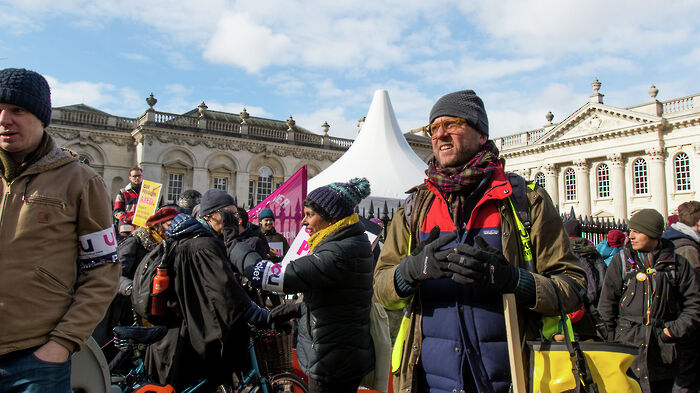Why many Cambridge staff aren’t striking
Varsity explains why many staff aren’t joining the industrial action

Amid the hustle of the UCU strike action, many Cambridge staff have not participated, continuing with their usual teaching routine.
A lack of involvement in strike action does not necessarily mean a lack of support for the strikes. Many staff are simply not union members, and thus not eligible to strike.
Some who have chosen not to strike are concerned about the immediate impact on students. While some of those striking also see their actions as part of a broader campaign in the interests of students and staff to prevent the marketisation of higher education, many academics may feel that it is unfair for 14 days of content to be missed and thus have chosen to continue teaching for the immediate benefit of students.
The financial cost of participating in strikes is also something staff have had to consider in choosing whether to strike. Pay is deducted for each strike day, so striking is less viable for those in weaker financial positions.
However, some staff on the lower end of the salary scale appear to have traded short term financial pain for longer term financial security, which they believe will be more easily guaranteed through maintaining the current pension scheme, a main aim of the strike.
Many on temporary contracts have also been striking, despite any unease they may have around their job security as a result of doing so.
Those who have continued to teach appear to be disproportionately senior staff; relatively few professors are striking. This may be due to the fact that the pension scheme is capped once salaries reach £55,000 per year, meaning higher earners are not hit as hard by the reforms as their junior colleagues and so feel less inclined to strike.
Less cynically, senior managerial staff may feel that their obligations to Cambridge render them unable to participate in strike action. While they may sympathise with the reasons for strike action, some perhaps see their position within the University as a way of delivering change to the system.
Notably, a significant proportion of the Economics faculty has not participated in the strikes so far.
This may be due to the fact that the market among universities for academic economists is more international and thus staff are more mobile. They may not feel as tied to the British university pension scheme as academics in other departments as they are more able to find new work in different countries than staff in departments with more UK-specific curricula.
Economics staff are also more likely to have the potential to earn external income, for example through consulting, and such are not so reliant on their pension.
This could also be ideologically-based, with free-market economists less concerned by claims that the higher education sector is being marketised. Many economists are opposed to strike action as they deem the reforms necessary to ensure the long-term financial sustainability of the higher education sector.
Moreover, gains achieved by striking workers may ultimately have to be funded through other means, which could drive up costs for universities. If Cambridge does go down the path of contributing further to its staff’s pensions, this may limit funds in other areas. In an email to staff and students on Thursday, vice-chancellor Stephen Toope noted that a University-funded solution “would likely require trade-offs and cuts in other parts of the University”.
Many staff are reluctant to strike, and most of them are even more reluctant to explain why they’re not. But this is an issue which affects the whole higher education system, and the debate should not be confined to ivory towers.
 Comment / Plastic pubs: the problem with Cambridge alehouses 5 January 2026
Comment / Plastic pubs: the problem with Cambridge alehouses 5 January 2026 News / Cambridge businesses concerned infrastructure delays will hurt growth5 January 2026
News / Cambridge businesses concerned infrastructure delays will hurt growth5 January 2026 News / New movement ‘Cambridge is Chopped’ launched to fight against hate crime7 January 2026
News / New movement ‘Cambridge is Chopped’ launched to fight against hate crime7 January 2026 News / AstraZeneca sues for £32 million over faulty construction at Cambridge Campus31 December 2025
News / AstraZeneca sues for £32 million over faulty construction at Cambridge Campus31 December 2025 News / Uni-linked firms rank among Cambridgeshire’s largest7 January 2026
News / Uni-linked firms rank among Cambridgeshire’s largest7 January 2026









